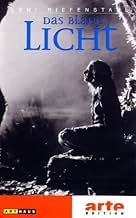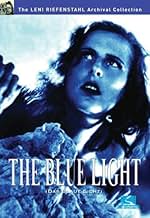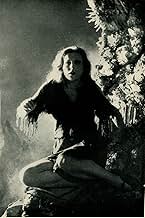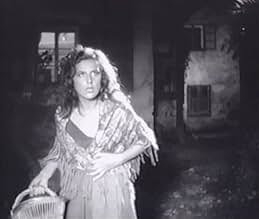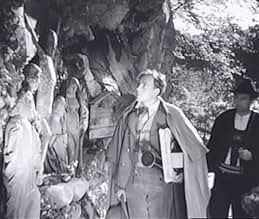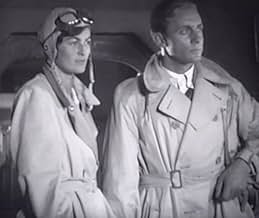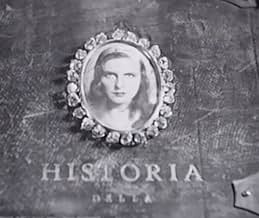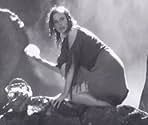IMDb RATING
6.8/10
1.4K
YOUR RATING
When the moon is full, young men die attempting to reach the mysterious blue light in the mountains.When the moon is full, young men die attempting to reach the mysterious blue light in the mountains.When the moon is full, young men die attempting to reach the mysterious blue light in the mountains.
- Awards
- 1 win & 1 nomination
Storyline
Did you know
- TriviaThis was a groundbreaking film at the time. It was a sound film shot all on location high in the mountains. Real mountain people were used as supporting players.
- GoofsAt about 20 minutes the moon comes up and moves from right to left. In the northern hemisphere it moves from left to right.
- Alternate versionsDirector Leni Riefenstahl recut and re-released a new version of the film in 1952.
- ConnectionsEdited into The Wonderful, Horrible Life of Leni Riefenstahl (1993)
Featured review
`The Blue Light' tells the story of a small mining village lying in the shadow of an unusual mountain. During every full moon a blue light issues from the peak, causing young men in the village to take leave of their senses and attempt to climb the mountain in the middle of the night. This always ends in death for one of the village men.
Junta, a young woman who lives in the hills outside the village, is the only person who has mastered the cliffs, and because of this she is an outcast. One day a stranger arrives in the village, and this man becomes entranced not with the blue light but with Junta. Eventually, he follows her up the peak and discovers the mountain's mystery, which Junta has so far kept to herself. Unlike Junta, though, the stranger cannot keep a secret. A minor catastrophe ensues, signaling simultaneously the doom of Junta and of the modern imagination.
It seems uncomfortably ironic that the film was both directed by and stars--as Junta--Leni Riefenstahl, the woman who would later become known as `Hitler's filmmaker,' responsible for some of the most notorious Nazi propaganda films. Nevertheless, `The Blue Light' remains a remarkable achievement for its operatic tone and imagery and for the brilliant mountain climbing sequences. Junta's final scene is especially striking, ending in a sequence which blends compelling symbolism with poetic cinematography--a moment worthy of Jean Cocteau.
In his autobiography, author Robert Aickman noted `The Blue Light' as his favorite film. He called it a `fable of the post-machine world and of the nature of love.' Elsewhere Aickman wrote: `Dr. Freud established that only a small part, perhaps one-tenth, of the human mental and emotional organisation is conscious. Our main response to this discovery has been to reject the nine-tenths unconscious more completely and more systematically than before.' Junta is one of those rare figures who is in tune with the enigmatic blue light of the unconscious self and open, as well, to that vital emotional reaction to natural beauty. It is this that makes Junta worth more than a hundred villages filled with greedy mountain-tamers. Perhaps it is no great mystery that a German film like `The Blue Light' should be made as Hitler gained power; insightful expressions of the human soul have always erupted in the most unlikely of times and with the dream thieves following close behind.
Junta, a young woman who lives in the hills outside the village, is the only person who has mastered the cliffs, and because of this she is an outcast. One day a stranger arrives in the village, and this man becomes entranced not with the blue light but with Junta. Eventually, he follows her up the peak and discovers the mountain's mystery, which Junta has so far kept to herself. Unlike Junta, though, the stranger cannot keep a secret. A minor catastrophe ensues, signaling simultaneously the doom of Junta and of the modern imagination.
It seems uncomfortably ironic that the film was both directed by and stars--as Junta--Leni Riefenstahl, the woman who would later become known as `Hitler's filmmaker,' responsible for some of the most notorious Nazi propaganda films. Nevertheless, `The Blue Light' remains a remarkable achievement for its operatic tone and imagery and for the brilliant mountain climbing sequences. Junta's final scene is especially striking, ending in a sequence which blends compelling symbolism with poetic cinematography--a moment worthy of Jean Cocteau.
In his autobiography, author Robert Aickman noted `The Blue Light' as his favorite film. He called it a `fable of the post-machine world and of the nature of love.' Elsewhere Aickman wrote: `Dr. Freud established that only a small part, perhaps one-tenth, of the human mental and emotional organisation is conscious. Our main response to this discovery has been to reject the nine-tenths unconscious more completely and more systematically than before.' Junta is one of those rare figures who is in tune with the enigmatic blue light of the unconscious self and open, as well, to that vital emotional reaction to natural beauty. It is this that makes Junta worth more than a hundred villages filled with greedy mountain-tamers. Perhaps it is no great mystery that a German film like `The Blue Light' should be made as Hitler gained power; insightful expressions of the human soul have always erupted in the most unlikely of times and with the dream thieves following close behind.
- How long is The Blue Light?Powered by Alexa
Details
- Runtime1 hour 25 minutes
- Color
- Aspect ratio
- 1.37 : 1
Contribute to this page
Suggest an edit or add missing content


